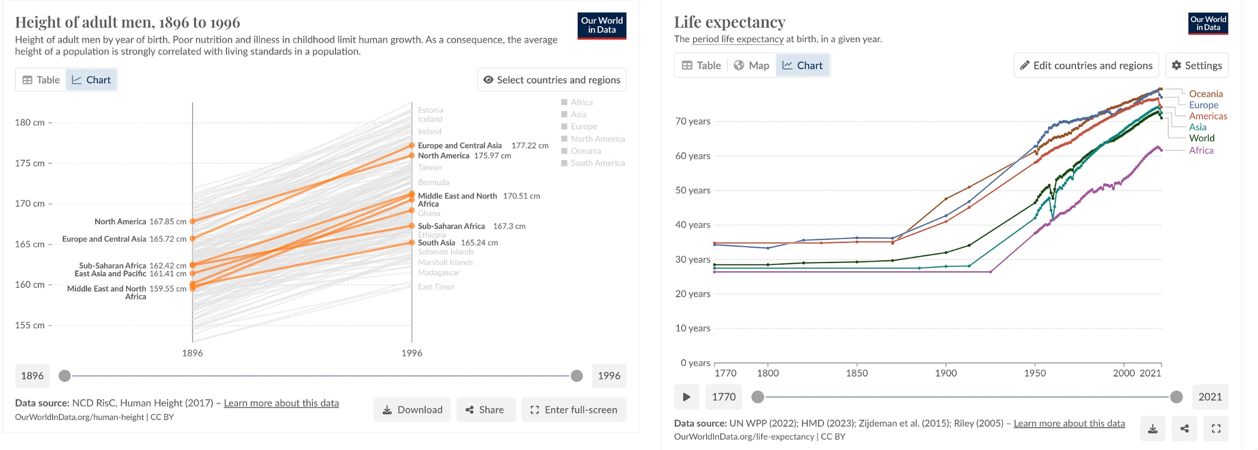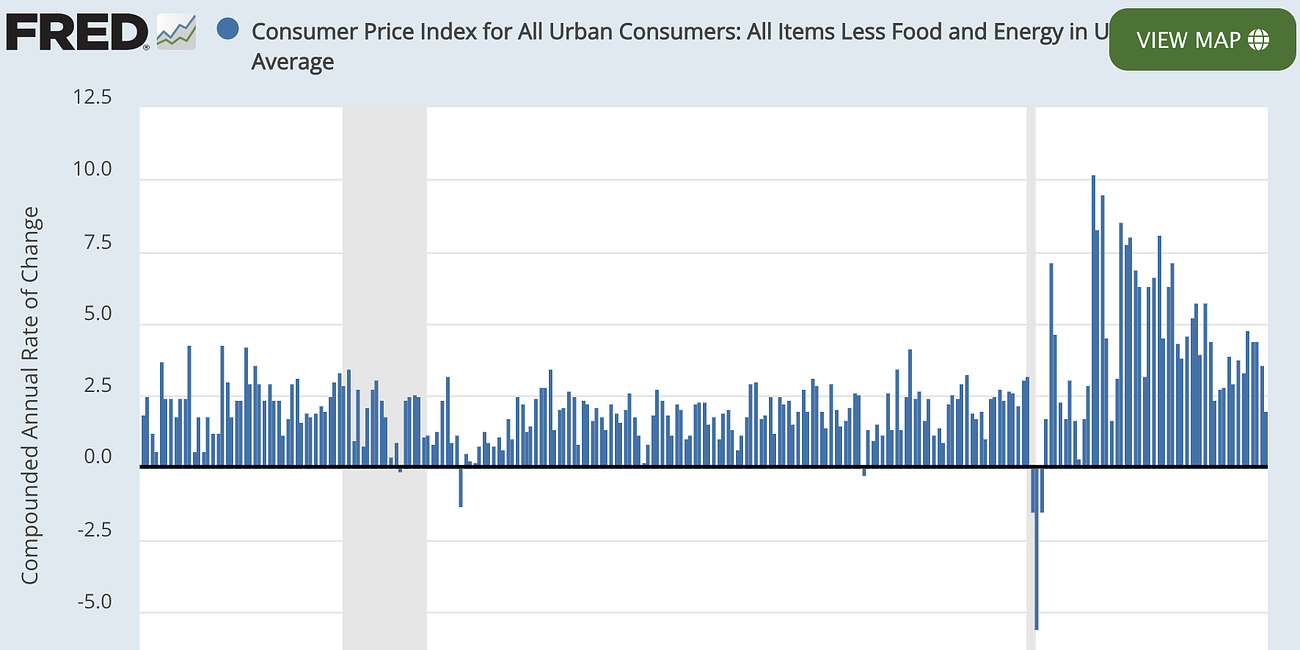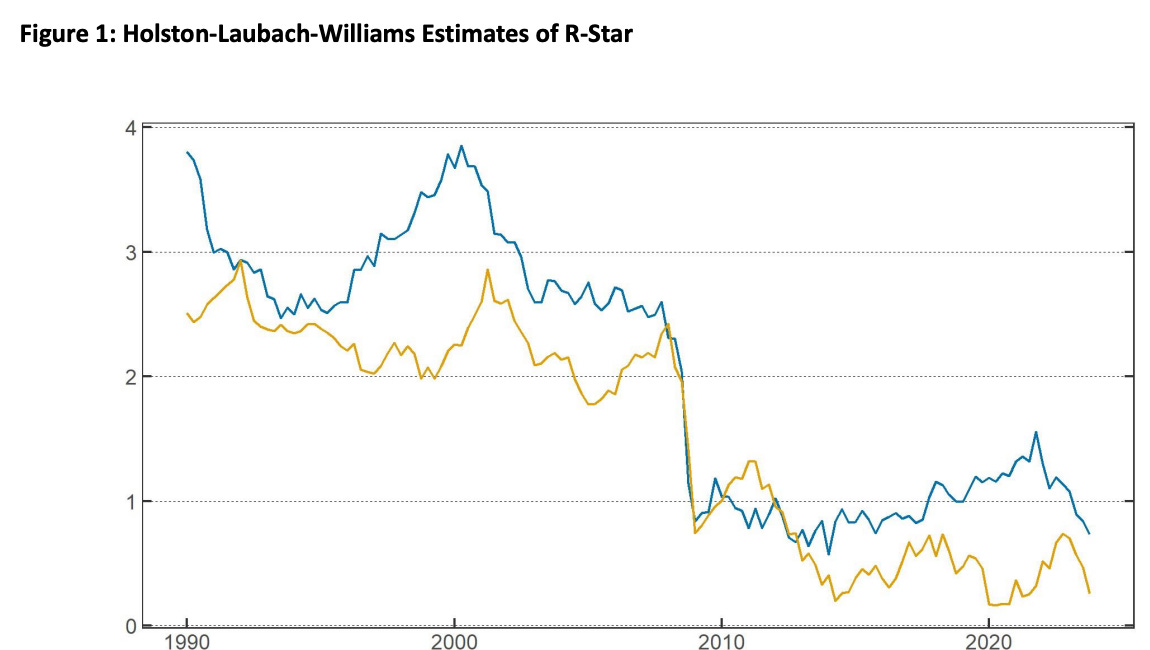WEEKLY BRIEFLY NOTED: For 2024-07-19 Fr
Human biomedical prosperity over time; the geology of Yosemite’s Half-Dome; very briefly noted; & the poor stockinger, Éric Monnet’s Balance of Power: Central Banks & the Fate of Democracies...
Human biomedical prosperity over time; the geology of Yosemite’s Half-Dome; very briefly noted; & the poor stockinger, Éric Monnet’s Balance of Power: Central Banks & the Fate of Democracies; Harold James’s Seven Crashes: The Economic Crises That Shaped Globalization; Notes on Friedrich Engels’s “relative autonomy of the state”; what inflation numbers is Jay Powell looking for, precisely; & weekly briefly noted…
TWO IMAGES: Human Biomedical Prosperity Over Time:
ONE VIDEO: Half Dome’s Geology:
Very Briefly Noted:
Economics: When a technology becomes a football in an ethno-culture war spoked by grifters, things are likely to be very ill-done:
Edward Ludlow & Max Chafkin: How Rivian Became the Anti-Tesla: ‘The startup persuaded Elon-phobic car buyers to drop $70,000 on its EVs. Now it just needs to make money…. Chris Hilbert has complicated feelings about his Tesla…. Recently, when Hilbert complained on social media that his car’s “Full Self-Driving” system seemed to consistently fail to stop for school buses, he was greeted with a mixture of denial (“Fake news as usual”) and ridicule (“You suck”). “The big problem is, there’s Tesla and there’s TSLA,” Hilbert says, referring to the two species of Tesla fan. The first group cares about the cars and is basically like Hilbert. The second is mostly interested in pumping up the stock ticker and attacking anyone who isn’t doing the same. “The stockholders are the toxic bit of it,” he says… <https://www.bloomberg.com/news/features/2024-07-11/rivian-is-a-hit-with-ev-buyers-turned-off-by-elon-musk?cmpid=BBD071424_businessweek>.
Noah’s hypothesis 3 makes no sense to me: the US sells to the demanding market other companies are supposed to gain manufacturing prowess by figuring out how to sell to. Hypothesis 1 is driven by Hypothesis 2 plus “financialization”. As for Hypothesis 4—we will see whether China’s manufacturing advantage turns out in the long run to be anything other than lower real wages, won’t we?:
Noah Smith: Why has U.S. manufacturing productivity stagnated for over a decade?: ‘Hypothesis 1: U.S. manufacturers don’t buy enough machinery: One popular explanation for stagnating labor productivity in U.S. manufacturing is low capital investment.… Hypothesis 2: The sector is too concentrated.… Hypothesis 3: The U.S. doesn’t export enough…. Industrial policy enthusiasts tend to be fans of the idea of “export discipline”…. Hypothesis 4: The end of the rainbow…. <https/://www.noahpinion.blog/p/why-has-us-manufacturing-productivity>.War: No matter what Napoleon may have said in the pre-industrial past, in the industrial world it is not the case that for war the mental is to the material as three is to one:
Geoffrey Jukes: Stalingrad to Kursk: ‘Lend-Lease accounted for 59 per cent of aviation fuel, 33 per cent of explosives, 45.2 per cent of copper ore, 55.5 per cent of aluminium, 27.9 per cent of machine tools, 15.1 per cent of meat, 29.5 per cent of sugar, 30.1 per cent of tyres, and over 80 per cent of railway locomotives and rolling stock. Soviet-era denigration of Lend-Lease as a whole was not based on a genuine belief that it was unimportant, but was for cold-war propaganda purposes…. Censorship deleted even passing references in memoirs. For example, a passage in which Zhukov attributed the shift of much of the Red Army’s artillery from horse to mechanical traction to ‘receipt from the USA under Lend-Lease of Studebaker vehicles with increased cross-country capability’ was deleted. And not until post-Soviet times was the text published of a toast to Roosevelt, proposed by Stalin at a dinner during the Teheran Conference (28 November–1 December 1943). It ran: “The absolute main thing in this war is machines. The United States has demonstrated that it can produce from eight thousand to ten thousand aircraft a month. Russia can produce at least three thousand aircraft a month. England produces from three thousand to three thousand five hundred a month, mostly bombers. Therefore the United States is the land of machines. Without the use of those machines, with the aid of Lend-Lease, we would have lost the war.” Zhukov was even more categorical…. “They say the Allies never helped us.… But it can’t be denied that the Americans rushed us so many materials without which we couldn’t have formed our reserves and couldn’t have continued the war.… We received 350 thousand motor vehicles, and such vehicles!… We didn’t have explosives or gunpowder. We didn’t even have anything to power rifle bullets.… The Americans really baled us out with gunpowder and explosives. And they rushed us so much sheet steel. Could we have organised tank production so quickly if we hadn’t had American help with steel? And now the affair is presented as if we had all this ourselves in abundance.”… <https://tinyurl.com/msu2cazz>MAMLMs: How long would it take to build out a system to train MAMLMs on non-NVIDIA chips, and thus avoid paying the NVIDIA tax? That is what Google and Apple are doing with the chips they design. But it seems that almost nobody else thinks that they can afford to pay the time cost involved in getting such a thing up and running: that they have to train NOW!!!!!:
M.G. Seigler: Oh, What a Tangled Web of NVIDIA Chips We Weave: ‘xAI is walking away from an Oracle deal to build a "supercomputer"… [with] up to 100,000 NVIDIA GPUs… [to] build their own datacenter with NVIDIA chips supplied by Dell and Supermicro… on top of the 24,000 NVIDIA chips xAI is already renting from Oracle. So instead, Oracle has signed a deal with Microsoft to rent many of the NVIDIA chips that were meant for xAI. Microsoft, in turn will give them to OpenAI… on top of the deal Microsoft struck with CoreWeave… to access clusters of their NVIDIA chips… on top of the NVIDIA chips Microsoft has purchased on their own… [and] got access to in exchange for their non-deal deal with Inflection…. VCs are reportedly buying massive clusters of NVIDIA GPUs to offer them up to startups in their portfolios. Or they may be renting them from another startup. Either way, NVIDIA wins… <https://spyglass.org/follow-the-nvidia-chips/>The glory of language is that you can say anything with it. As Abraham Lincoln said, if you are clever enough, you can argue that a horse chestnut is a chestnut horse, and you can do so plausibly and eloquently. And now we have developed GPT LLMs that can do precisely that, and do it every day at scale. But this is not reasoning about the world. This is just throwing dice and choosing pads through language space:
Kaleberg: ‘If you were following artificial intelligence in the 1980s, you'd remember… ontological [AI]… describing and reasoning about things in the real world… [and] case based reasoning…. One could infer everything given enough cases or examples…. The lone example of useful AI that was offered [by Lucidity was] using natural language to produce filters for a task management system. Why might this be useful? One obvious reason is that the task management system has an ontology… [and] is hard coded to deal with all this stuff…. A large language model adds value by being able to convert natural language into a much more limited, highly focused artificial language. This mirrors the experience of some of AI's most satisfied customers, programmers…. MassiveAI hype… the power of large language models… but they are unlikely to be useful save as entertainment without being linked to an ontological component…. This is an extremely old idea, but I expect people to figure it out in the next few years and then take a few more years to surface to the general public… <https://braddelong.substack.com/p/reading-ludicity-i-will-fing-piledrive/comments>Liberalism: Why we do politics:
Bret Devereaux: ‘Questions of how to resolve the tension between increasingly strong states and the religious and political differences of the people they governed were very prominent in the 17th century. Liberalism is designed to solve these problems… taking… key questions out of… politics… [and into] individual freedom…. Both… North European ‘freedom for Big Men’… as well as Roman libertas are aristocratic rights…. Locke is taking something that was a privilege of a few… and broadening it…. Universalizing… through natural law brings in a value in liberalism that may have been, until now, conspicuous by its absence: equality…. Locke… [is] looking to solve a problem created by modernity and reaching back to cultural values and ancient ideas (natural law and liberty) to do so and then positing (incorrectly) an idealized past…. For the United States… this was the political philosophy ‘on the shelf’ when it came time to create a new country…. Property… a sticking point for many left-leaning folks… are core to the success of liberalism, because sharply limiting the communal claim on private property lowers the stakes of politics…. The alternative… is typically not ‘no one owns things’ but rather the state owns things and you do not…. Outside of that [liberal] tradition is a wasteland of oppressive, authoritarian regimes, endless sectarian wars and economic stagnation. And… a liberal society… provides the greatest opportunity of any for dignity, virtue and honor… <https://acoup.blog/2024/07/05/collections-the-philosophy-of-liberty-on-liberalism/>Cognition: The importance of marking your beliefs to market:
Jim O’Shaugnessy: Mistakes were Made. (And, Yes, by Me.): ‘I’m lucky that I keep journals in real time, in that it helps me avoid something we all face—hindsight bias…. It’s almost impossible for us to accurately recall what we were thinking and the version our brain serves up to us is, to be charitable, very kind to us but also incredibly wrong…. Be humble…. Take the money…. Don’t overanalyze…. Understand people’s motives…. Understand how fragile the average person is…. Murphy was an optimist—expect six-sigma events as normal, not extraordinary…. Mistakes provide a lesson-rich environment. But you’ve got to own your mistakes. You’d be compounding them if you tried to point your finger at anything or anyone other than yourself…. If you have the ability to say “I was wrong” and truly believe and learn from it, you’re close to gaining a new superpower… <https://jimoshaughnessy.tumblr.com/post/175118354574/mistakes-were-made-and-yes-by-me>Political Economy: This was the Gingrich strategy: people get more liberal when we see the government functioning properly, so let us make sure the government cannot function properly. What I do not understand is why the Tories were able to avoid blame for the government not functioning properly until this month. Yes, Jeremy Corbin was and is a real idiot, and a Labour leader-selection process that elevated him is bats--- insane. Yes, Brexit can be seen as a hostile takeover of the Tories precisely because voters did hang responsibility for things not working on Cameron (as well as on Labour). Yes, we are unlikely to see a Starmer-level event in the United States because the U.S. governmental orrery makes it easy to claim that it is really somebody else’s fault. So I remain much less optimistic:
Daron Acemoglu: The Starmer Model: ‘Starmer emphasized moderation and policies to improve the economy and public services. His victory shows that it is possible to win elections without extremism. He promised to make democracy work better for everyone. This is a powerful message…. People become much more pro-democratic when they see democracy functioning properly and delivering in terms of economic growth, stability, public services, and low levels of inequality and corruption. The same basic formula has worked well for workers’ parties and social democrats elsewhere. The birth of the storied Nordic model can be traced to election victories by workers’ parties in Denmark, Sweden, and Norway almost a century ago. These parties first moved away from hard left ideas and rhetoric. Then, once in power, they delivered on the concrete improvements they had promised… <https://www.project-syndicate.org/commentary/starmer-labour-party-plan-to-boost-economic-growth-invest-in-public-services-by-daron-acemoglu-2024-07>Democracy in History: How did modern democracy happen in Europe, anyway?:
Dan Ziblatt: How Did Europe Democratize?: ‘Democratization in Europe… often entailed… undemocratic upper chambers, electoral districts, clientelism, and corrupt voting… bolster[ing] democracy by securing traditional elite support for minimally democratic procedures…. When economic assets become more mobile and less specific… élites… are not as threatened by… democracy…. In middle sector democratization… [the] push for inclusion from traditional elites. In electoral support mobilization those in power… extended the franchise… [to win] political competition[s]…. Joint project democratization… entails labor working with liberal parties…. The different dimensions of democracy—universal suffrage, parliamentary autonomy, civil rights—were created at different times possibly for different reasons, and the intersection of the different institutional configurations may have had important but unanticipated consequences… <https://www-jstor-org.libproxy.berkeley.edu/stable/pdf/40060135>Management Cybernetics: The long run-incentives for the African National Congress’s personnel to prioritize doing the job, and organizing themselves so that they do do the job of service provision—those are very high indeed. The short run incentives, however, are not. The question of how to build human systems that provide short-term incentives for individuals to coöperate and do the job rather than to shirk—that remains one of humanity’s major problems:
Timothy Burke: Chickens Come Home to Roost: ‘Why exactly has the African National Congress been so bad at the management of its government in many basic areas of service provision, particularly since 2009, which led to its major electoral shortfall this month?… There are governments that have a lot of resources but are at best inconsistent in service provision. When do the political leaders of a given nation-state pay attention to what they’re being told about services or have reliable data collection, when do leaders align themselves behind technical quality and managerial competence in services, when are there immediate political and professional consequences for screwing up services like fire suppression, garbage pick-up, road maintenance, energy infrastructure, food security, emergency response and so on? When do leaders in democracies—or maybe even some authoritarian states—regard service delivery as a political necessity?… Wherever that is, it’s not South Africa since the mid-2000s, in any event. But perhaps this election will send the message that from here on in, doing better will be a requirement for political survival… <https://timothyburke.substack.com/p/chickens-come-home-to-roost>











Noah Hypothesis 3. Exporting, or rather not exporting is sort of a circuit breaker for bad industrial policy. "If you can't export even with our subsidies, maybe we should just forget about the subsidies."
Plus it's an excuse to rail against import restrictions -- Lerner theorem and all that -- AND, double rail, fiscal policy that created net capital inflow => strong dollar => fewer exports. No idea if it has anything to do with _manufacturing_ productivity, but fiscal/monetary policy was not "tight fiscal/expansive monetary" as recommended in the neo Social Democracy <nee Left Neoliberalism> textbooks to promote rapid per capita growth.
I'm Tesla-phobic because I resent the wasted deadweight loss that could have gone into marginal adjustments to a tax on net emissions of CO2 AND that the subsidies were financed with growth-draining deficit, not even with taxes on income, much less taxes on consumption.